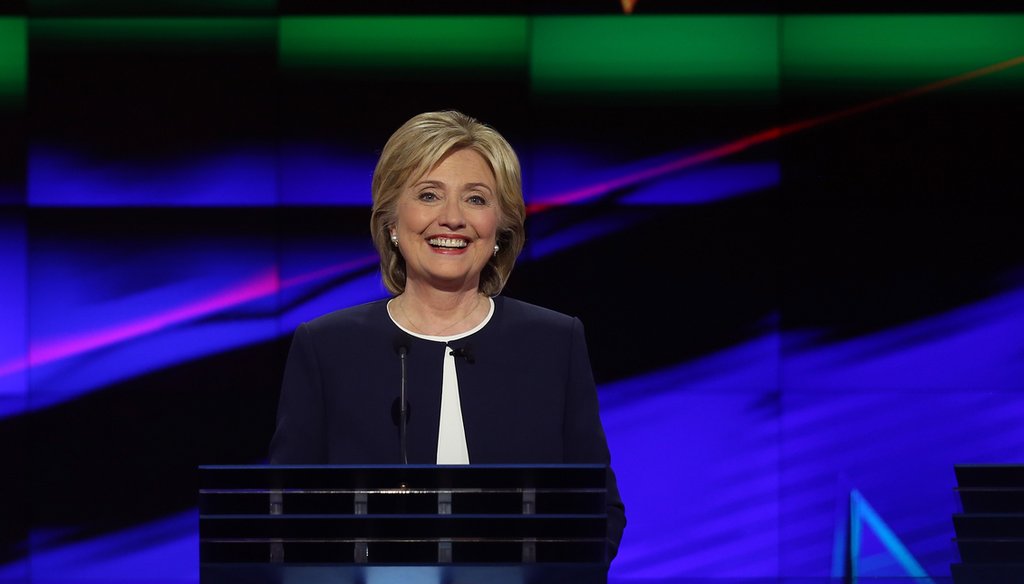Get PolitiFact in your inbox.

Democratic presidential candidate Hillary Clinton takes part in a presidential debate sponsored by CNN and Facebook at Wynn Las Vegas on October 13, 2015. (Joe Raedle/Getty Images)
Hillary Clinton’s use of a private email server was certainly unusual, but was it allowed by the State Department?
"I've taken responsibility for it. I did say it was a mistake," the former secretary of state said at the first Democratic debate of the 2016 presidential race. "What I did was allowed by the State Department, but it wasn't the best choice."
But was it really allowed? Officials have consistently said Clinton didn’t violate any department rules by using a private email instead of an @state.gov address. And, there wasn’t an explicit prohibition against federal employees using personal emails when Clinton was in office.
Still, we hesitate to label this statement accurate, because there are so many unknowns.
If State Department officials did specifically agree to let her use private email exclusively, the move still violates the spirit of the laws on government transparency and recordkeeping. (We first looked at this issue back in March.)
"While Clinton may have technical arguments for why she complied with each of these and the other rules that have been discussed in the news, the argument that Clinton complied with the letter and spirit of the law is unsustainable," said Douglas Cox, a law professor at City University of New York who studies records preservation.
Federal Records
It seems Clinton didn’t break a rule simply by using a personal email to conduct business because that wasn’t explicitly prohibited. Rather, by using personal emails exclusively, she skirted the rules governing federal records management, Cox said.
A federal record is any documentary material, regardless of physical form, made or received by a government agency, according to the National Archives and Records Administration (NARA). Records are preserved as evidence of the agencies’ activities, decisions and procedures. Each agency is responsible for maintaining its records in accordance with regulations.
It would have been a violation of NARA rules in the Code of Federal Regulations for Clinton to use personal email exclusively, said Daniel Metcalfe, former director of the U.S. Justice Department’s Office of Information Policy, where he administered implementation of the Freedom of Information Act.
The code requires federal agencies to make and preserve records that duly document agency activity, so that they are readily available when needed -- such as for FOIA requests or congressional inquiries.
"Anyone at NARA would have said you can’t use a personal email account for all of your official business," said Metcalfe, who held his position in part during former President Bill Clinton’s administration.
Had Clinton used a @state.gov email address, every email sent and received would have been archived in the State Department system. Clinton, who served from 2009 to 2013, has argued that the vast majority of her emails were archived in the system because she was in the habit of sending them to other government employees with .gov email addresses.
However, experts said this defense is insufficient because it would have still caused problems for efficient record-keeping, as evidenced by Gawker’s 2013 FOIA request to the State Department.
Gawker requested emails between Clinton and long-time adviser Sid Blumenthal after a hacker had revealed emails that Blumenthal sent Clinton. Although the emails were already known to the public, the State Department told Gawker that no such correspondence existed. Gawker believes this shows that Clinton was able to use her personal email to thwart the FOIA process.
In response to a State Department request last year, Clinton turned over 55,000 pages of emails and documents from her private email server, leaving out emails and documents that she said were of a personal nature. She later said she deleted these personal emails.
Cox said the fact that Clinton’s private staff -- rather than a State Department federal records officer -- chose which emails to destroy is "honestly breathtaking."
In Clinton’s defense, it was only after she left the State Department that the National Archives issued an official recommendation that government employees should avoid conducting official business on personal emails (though they noted there might be extenuating circumstances such as an emergency that require it). Additionally, in 2014, President Barack Obama signed changes to the Federal Records Act that explicitly said federal officials can only use personal email addresses if they also copy or send the emails to their official account.
Because these rules weren’t in effect when Clinton was in office, "she was in compliance with the laws and regulations at the time," said Gary Bass, founder and former director of OMB Watch, a government accountability organization.
"Unless she violated a rule dealing with the handling of classified or sensitive but unclassified information, I don’t see how she violated any law or regulation," said Bass, who is now executive director of the Bauman Foundation. "There may be a stronger argument about violating the spirit of the law, but that is a very vague area."
Metcalfe pointed to Clinton’s use of the word "allowed" and "opted" throughout a press conference in March about her private email. He said both words give the false impression that the law and its proper implementation presented her with a choice. She might have been "allowed" to use only a private email account in that no one stopped her, Metcalfe said, but that’s not the same thing as lawfully complying with rules.
Our Sources
Debate transcript, Oct. 13, 2015
PolitiFact, "Hillary Clinton's email: Did she follow all the rules?" March 12, 2015
PolitiFact, "Hillary Clinton's emails: classified or not?" Sept. 10, 2015
PolitiFact, "Hillary Clinton: Emails wouldn't be public if I hadn't asked for it," Aug. 20, 2015
Washington Post, "Hillary Clinton’s claim that ‘everything I did [on e-mails] was permitted,’" July 9, 2015
NPR, "Fact Check: Hillary Clinton, Those Emails And The Law," April 2, 2015
















































